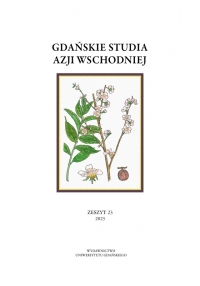Ulotne obrazy słowem malowane. Tłumaczenia jueju Tang Yinga 唐英 (1682–1756) autorstwa studentów trzeciego roku sinologii Uniwersytetu Gdańskiego
Ephemeral pictures painted with words: jueju by Tang Ying 唐英 (1682–1756) translated by third-year Sinology students at the University of Gdańsk
Author(s): Amelia MacioszekSubject(s): History, Language and Literature Studies, Cultural history, Local History / Microhistory, Modern Age, 17th Century, 18th Century
Published by: Wydawnictwo Uniwersytetu Jagiellońskiego
Summary/Abstract: This article aims at introducing Tang Ying (1682–1756), who is better known as the manager of the Jingdezhen manufacture than as a poet. Some of his short and expressive poems known in Chinese literature under the name of jueju 絕句 were translated by my students during our classical Chinese club sessions. Each translation is different not only because of the fact that each poem is different, but also because each of the students has his/her unique way of looking at the poems and understanding them. Poetry translation is one of the hardest tasks, as it requires not only knowledge of the language from which it is being translated, but also a unique skill in grasping a poem’s essence. Even though little is known about where and how jueju developed, the dominant theories speculate that they have their source during the Tang dynasty. They are known for their brevity and their poignant nature, which enchanted not only professional poets, but also “laymen” in this regard such as Tang Ying.
Journal: Gdańskie Studia Azji Wschodniej
- Issue Year: 2023
- Issue No: 23
- Page Range: 73-83
- Page Count: 11
- Language: Polish

